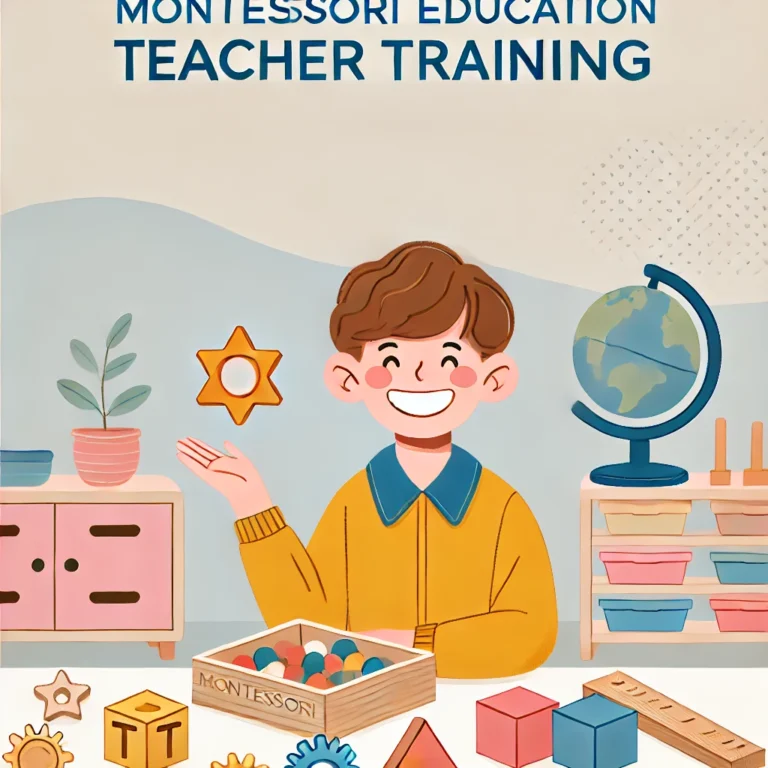
Montessori education is a globally recognized teaching methodology focused on fostering independence, curiosity, and holistic development in children. Becoming a certified Montessori teacher requires specialized training that equips educators with the tools, techniques, and philosophy of the Montessori method.
This article delves into the details of Montessori education teacher training, its benefits, components, and how you can embark on a rewarding career in Montessori education.
What Is Montessori Education?
Montessori education, developed by Dr. Maria Montessori, is a child-centered approach that encourages hands-on, self-directed learning. It prioritizes the natural development of children by providing a prepared environment where they can explore and learn at their own pace.
The Montessori method emphasizes:
- Independence
- Freedom within limits
- Respect for the child’s natural psychological development
Educators play the role of guides, facilitating rather than directing the learning process.
What Is Montessori Education Teacher Training?
Montessori teacher training is a specialized program that prepares educators to implement the Montessori philosophy and methods effectively. These programs focus on equipping teachers with the skills needed to create a supportive and engaging learning environment.
Benefits of Montessori Teacher Training
- Global Recognition
Montessori-certified teachers are in high demand worldwide, opening doors to career opportunities in prestigious schools. - Versatile Teaching Skills
Montessori training develops versatile skills that are applicable to a wide range of teaching environments, including traditional and progressive classrooms. - Understanding Child Development
The training provides a deep understanding of child psychology, enabling teachers to nurture each child’s unique potential. - Career Advancement
Certification enhances professional credibility and provides a competitive edge in the education sector. - Personal Growth
The Montessori method’s emphasis on respect, patience, and creativity also fosters personal growth for educators.
Key Components of Montessori Education Teacher Training
Montessori teacher training programs are designed to cover essential aspects of the Montessori philosophy and methodology. Here’s what you can expect:
1. Montessori Philosophy
Understanding the core principles of Montessori education is the foundation of any training program. This includes:
- The role of the teacher as a facilitator
- The importance of a prepared environment
- Emphasis on child-led learning
2. Child Development
Training includes in-depth studies of child development stages, helping teachers understand physical, emotional, and cognitive growth from infancy to adolescence.
3. Montessori Materials
Hands-on training with Montessori materials is a significant component. These materials are designed to encourage exploration, problem-solving, and independent learning.
4. Classroom Management
Teachers learn how to set up and manage a Montessori classroom effectively, ensuring a balanced and harmonious learning environment.
5. Observation and Assessment
Teachers are trained in observation techniques to assess a child’s progress without relying on traditional testing methods.
6. Practical Teaching Experience
Most programs include internships or supervised teaching practice in Montessori classrooms, allowing teachers to apply their knowledge in real-world settings.
How to Become a Certified Montessori Teacher
To become a certified Montessori teacher, follow these steps:
1. Research Training Programs
Choose a program accredited by reputable organizations like:
- Association Montessori Internationale (AMI)
- American Montessori Society (AMS)
2. Select an Age Level
Montessori training is specific to age groups, such as:
- Infant & Toddler (0-3 years)
- Early Childhood (3-6 years)
- Elementary (6-12 years) Select the age group that aligns with your career goals.
3. Complete Training
Enroll in an accredited Montessori teacher training program. Training typically includes both theoretical studies and practical classroom experience.
4. Earn Certification
Upon completing the program, you’ll receive a certification that qualifies you to teach in Montessori classrooms worldwide.
5. Gain Experience
Look for opportunities to teach in Montessori schools to gain hands-on experience and refine your skills.
Top Institutions Offering Montessori Teacher Training
- Ali Institute of Education
Based in Pakistan, Ali Institute of Education offers comprehensive Montessori teacher training programs designed for aspiring and experienced educators. With experienced faculty and practical learning opportunities, it’s a top choice for those pursuing Montessori certification. - Montessori Training Centers
Globally, institutions accredited by AMI and AMS provide high-quality training with international recognition. - Online Programs
Many institutions offer online Montessori training, providing flexibility for working professionals.
Why Choose Montessori Teacher Training?
Montessori teacher training is not just about learning a methodology; it’s about embracing a philosophy that transforms the way you approach education. Here are some reasons to choose Montessori training:
- Empowering Children
Montessori teachers empower children to become independent learners and critical thinkers. - Rewarding Career
The joy of seeing children thrive in a Montessori environment makes teaching deeply fulfilling. - Dynamic Work Environment
Montessori classrooms are vibrant, engaging, and centered around exploration and creativity.
How Montessori Training Differs from Traditional Teacher Training
| Aspect | Montessori Training | Traditional Training |
|---|---|---|
| Teaching Style | Child-centered, facilitator role | Teacher-led, directive approach |
| Assessment | Observation-based, no grades | Standardized tests and grades |
| Classroom Setup | Prepared environment with Montessori materials | Traditional desks and chalkboards |
| Learning Pace | Self-paced, respects individual differences | Uniform pace for all students |
Challenges of Montessori Teacher Training
While highly rewarding, Montessori training can be challenging. Teachers must adapt to a new way of thinking and develop patience, observation skills, and a deep respect for each child’s learning journey.
Conclusion
Montessori education teacher training is a transformative journey that equips educators with the skills and mindset to nurture young minds effectively. With benefits like global recognition, career growth, and the opportunity to make a meaningful impact, Montessori training is a valuable investment for aspiring teachers.
If you’re ready to embark on this rewarding career path, consider enrolling in a program at a reputable institution like the Ali Institute of Education, where you’ll gain the knowledge and experience to thrive in the world of Montessori education.
Take the first step today and start shaping the future of education, one child at a time!